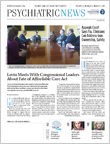Journalist and best-selling author Susannah Cahalan has a story not many can tell, and members attending this year’s Annual Meeting in San Diego get to hear it when she speaks at the meeting’s Opening Session.
Her presentation will follow the usual Opening Session ceremonies, including addresses by APA President Maria A. Oquendo, M.D., Ph.D., and incoming APA President Anita Everett, M.D.
In 2009, Calahan was living the life of an on-the-go young reporter for the New York Post when she fell—actually, “nose-dived” might be a better word—into an illness that physicians could not readily identify, though it mimicked in some ways the symptoms of psychosis. After a month in the hospital and a dizzying array of tests that turned up nothing, neurologist Souhel Najjar, M.D. (who is chair of the Department of Neurology at Hofstra University), diagnosed her with anti-NMDA receptor encephalitis, a rare autoimmune disease that afflicts few and had been identified only in 2007.
A December 7, 2008, report in Lancet Neurology by Josep Dalmau, M.D., and colleagues reported a case series of 100 patients with the disorder. They described it as “a severe form of encephalitis associated with antibodies against NR1–NR2 heteromers of the NMDA.” Patients who were treated rapidly with immunotherapy, as was Cahalan, survived.
In comments to Psychiatric News, Cahalan said she is excited to speak at the Opening Session. “I’m so thrilled that I’ve been invited by APA to share my story,” she said. “I can’t think of a better audience. Because the disease often presents with behavioral symptoms first, patients often see psychiatrists, psychologists, or social workers before any other doctor. I look forward to discussing my experience of psychosis and the ways that experience can be interpreted by physicians.”
Cahalan recounts the story in her best-selling 2012 book, Brain on Fire: My Month of Madness. She had to rely on research with doctors, friends, and family since she could remember almost nothing of the episode herself.
A review in the New York Times that year described it this way: “ ‘Brain on Fire’ is at its most captivating when describing the torturous process of how doctors arrived at that diagnosis—an extremely rare autoimmune disease almost undocumented in medical literature. The illness presented itself in malevolent fashion, with symptoms of bipolar disorder and schizophrenia, which are often indistinguishable from each other in their early stages: grandiosity, paranoia, bouts of irrational rage, incomprehensible utterances, and flat catatonic-like affect. There were also seizures, with ‘blood and foam’ spurting out of Cahalan’s mouth, that suggested not mental illness but a neurological disorder.”
Annual Meeting Program Chair Philip Muskin, M.D., M.A., said he believes Cahalan’s story is one that psychiatrists attending the meeting will not want to miss. “Psychiatrists know that there is much more about the brain that we don’t know compared with what we do know, and illnesses that are regarded as ‘medical mysteries’ are more common than the public may realize,” he said. “As psychiatrists, we also know how neurological symptoms can frequently mimic psychiatric symptoms and that there is a considerable overlap between neurology and psychiatry.
“Ms. Cahalan’s story is a fascinating one that will make for a lively opening to our 2017 Annual Meeting,” Muskin said. “I urge members not to miss the opportunity to hear from this remarkable woman.”
Cahalan lives in Jersey City, N.J. She is working on a new book project about the 1973 study by David Rosenhans, “On Being Sane in Insane Places,” and is seeking information that clinicians or others may have about the report and the individuals who participated in it. ■
The Opening Session will be held Sunday, May 21, at 4:30 p.m. in Exhibit Hall F in the San Diego Convention Center.


